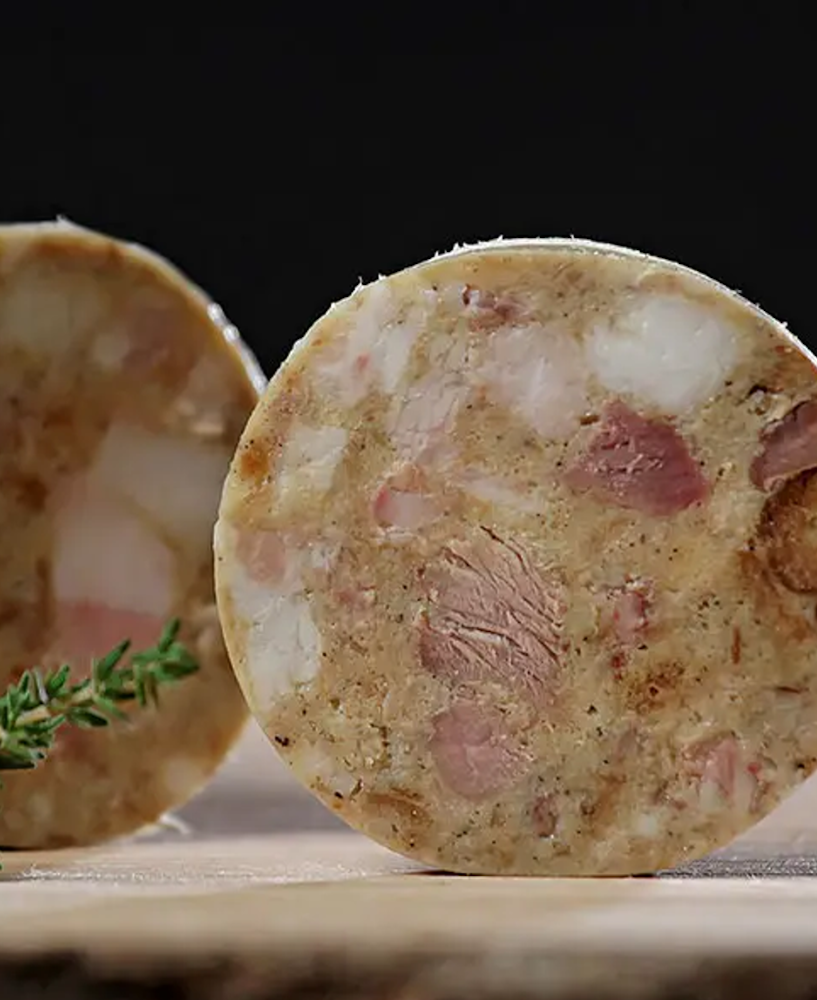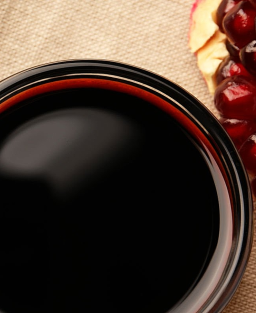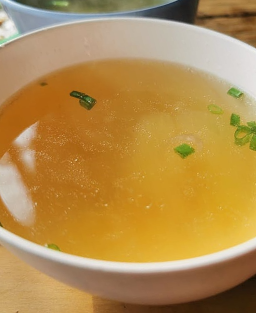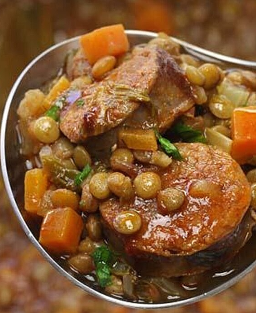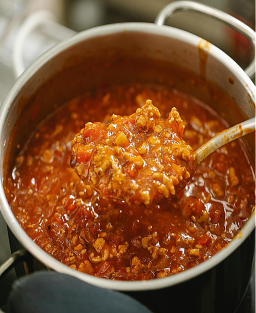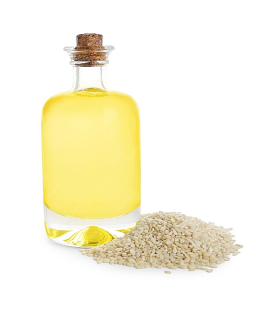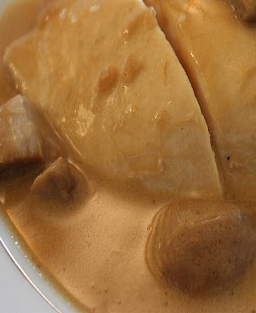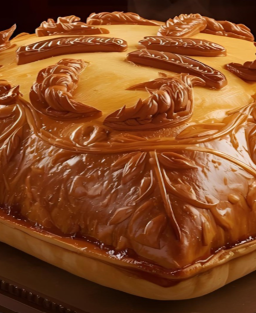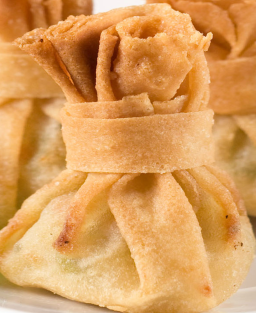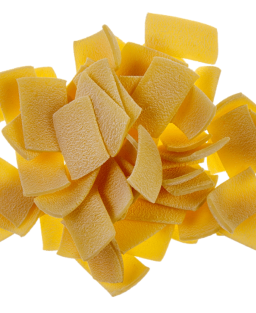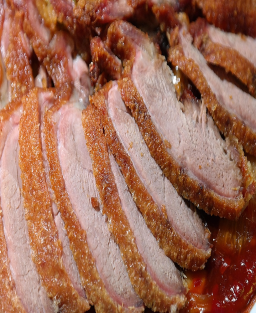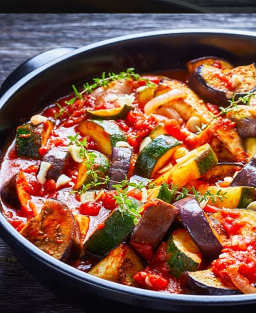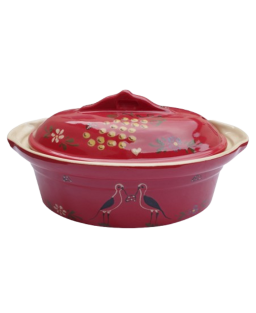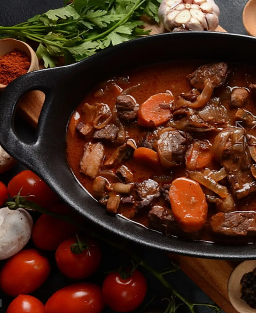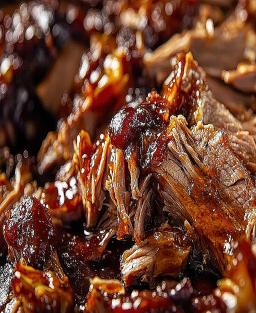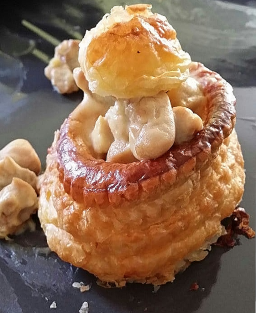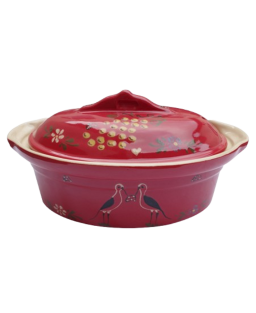Identity Recipe of Meslat from Languedoc – Traditional Rural and Urban Charcuterie
Identity Recipe of Meslat from Languedoc – Traditional Rural and Urban Charcuterie
Country / Region
-
Country: France
-
Region: Occitanie (southwest Aveyron and southeast Tarn)
-
Official status of main ingredient or recipe: None
-
Recipe creator: Rural transmission and family charcuterie of Languedoc, not codified by any chef or charcuterie house
-
Specification sheet: No
Proposed specification sheet:
-
Ingredients: stale bread, lean pork meat, pork fat (or pork jowl), eggs, milk, garlic, parsley, salt, pepper, nutmeg, pork casings.
-
Proportions: approximately 40% bread, 30% fat, 20% lean meat, 10% binding agents (eggs and milk).
-
Methods: soaking the bread, mincing the pork, mixing until homogeneous, stuffing into casings, gentle poaching.
-
Equipment: large bowl, meat grinder, sausage stuffer, large pot.
-
Containers: pork casings (thin for Aveyron, thick for Tarn).
-
Cooking: poach at about 85 °C (185 °F) for 45 minutes.
-
Storage: short-term in refrigerator (max 3 days), freezing possible.
Certification body: None
History
-
Origin of the recipe: inherited from rural traditions in Occitanie, Meslat is a peasant charcuterie made during “pig slaughter” (winter pig slaughter). The Occitan name “mèlsa” (spleen) recalls the original use of offal.
-
Recipe evolution: rural version (with offal) / urban version (refined, similar to a cervelas).
-
Notable chefs and contributions: No chef or charcuterie house has codified the recipe; it relies on family and regional transmission.
Identity Recipe of Meslat from Languedoc
Meslat is not just a rural charcuterie: it is an identity recipe of Languedoc, reflecting culture, terroir, and sharing. Originating from family slaughterings, it symbolizes hospitality and respect for tradition: “everything from the pig is eaten.”
-
Regional anchoring:
-
Aveyron (southwest): U-shaped, 400–500 g, rustic version that can include offal (spleen, liver, sometimes heart).
-
Tarn (southeast): thicker casing, 200–400 g, urban version, finer and more uniform, usually without offal.
-
-
Oral transmission: each village and family has its version, often adapted to available ingredients and tastes.
-
Cultural value: eaten cold or lightly pan-fried, accompanies local festivals, harvests, and family meals. Its variety of versions and social function make it a Languedoc identity recipe.
Legend or anecdote
In rural Aveyron, Meslat was one of the first charcuteries tasted after the pig slaughter, often still warm and thinly sliced for the children of the household.
Recipe description
Meslat is a traditional charcuterie, similar to white pudding but enriched with bread, eggs, and, depending on the version, offal. It is stuffed into pork casings and gently poached. Served cold in slices or lightly pan-fried.
Ingredients
| Ingredient | Quantity | Approx. Weight (g) |
|---|---|---|
| Stale bread (crumb) | 500 g | 500 g |
| Pork fat / jowl | 300 g | 300 g |
| Lean pork meat | 200 g | 200 g |
| Pork offal (spleen, liver, heart) | Depending on version | 50–150 g |
| Eggs | 6 | approx. 300 g |
| Milk | 1 liter | 1000 g |
| Garlic | 2 cloves | 10 g |
| Chopped parsley (optional) | 1 bunch | 20 g |
| Salt, pepper, nutmeg | To taste | - |
| Pork casings | - | - |
Note on regional and family variants:
-
Aveyron: more rustic, with offal, U-shaped casing.
-
Tarn: urban version, finer and more uniform, smaller portions, no offal.
-
Families: optional addition of blood, aromatic herbs, or spices according to taste.
Detailed preparation
Preparing the bread
-
Cut the stale bread into pieces.
-
Soak in cold or lukewarm milk until fully absorbed (15–20 minutes).
-
Drain slightly and crumble finely.
Preparing the meat and offal
-
Trim the jowl, lean meat, and offal, removing nerves and tough parts.
-
Pass through a medium-hole grinder to maintain texture.
-
Keep refrigerated.
Preparing the stuffing
-
Mix bread, meat, fat, and offal (if used).
-
Add eggs, garlic, parsley, salt, pepper, and nutmeg.
-
Work until a homogeneous and slightly sticky paste is obtained.
Preparing the casings
-
Desalt and rinse the casings thoroughly.
-
Soak 30 minutes in vinegar water, then rinse.
Stuffing
-
Fill casings up to 2/3 to avoid bursting.
-
Form 20–25 cm sections, tie with kitchen string.
Cooking
-
Poach in hot water (85 °C / 185 °F) for 40–50 minutes.
-
Prick to release air and excess fat.
-
Cool at room temperature.
Resting and storage
-
Rest 12 hours in the fridge to firm up.
-
Keeps 3 days in the refrigerator, freezing possible.
Tips and tricks
-
Replace part of the milk with cream for a lighter texture.
-
Maintain water at a gentle temperature to avoid bursting the casings.
-
Pan-fry slices in duck fat for more flavor.
-
Season nutmeg moderately.
Service
-
Presentation:
-
Rustic: cold slices on a board with bread and pickles.
-
Gastronomic: pan-seared medallions, celery purée, reduced jus.
-
-
Accompaniments: seasonal salad, mashed potatoes, green lentils from Le Puy.
Recommended wines and drinks
-
Wines: light red Gaillac, Marcillac (Mansois grape), Côtes-de-Millau red.
-
Other drinks: dry farmhouse cider, craft blonde beer, thyme infusion.
Revisited gastronomic version
-
Inspiration: fine ballotine cooked sous-vide at 75 °C (167 °F) for 1 h 30 min.
-
Presentation: medallions pan-seared in clarified butter.
-
Accompaniments: Jerusalem artichoke or celeriac purée, root vegetable pickles, reduced pork jus with red wine.
-
Plate presentation: contrast between the rustic Meslat and elegant garnishes.
-
Food-wine pairing: slightly chilled Marcillac red or dry Gaillac white.







